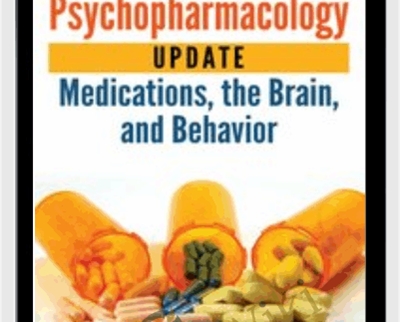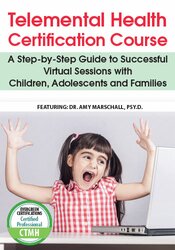Achieve more with the Psychopharmacology Update: Medications, the Brain, and Behavior – N. Bradley Keele course, priced at just Original price was: $219.99.$61.00Current price is: $61.00. on GBESY.biz! Explore our extensive collection of over 60,000 downloadable courses in Health and Medical. We offer professional, self-paced digital education at up to 80% off original rates. Start transforming your expertise now!
Salepage link: At HERE. Archive:
$219.99 $66 – Psychopharmacology Update: Medications, the Brain, and Behavior – N. Bradley Keele
Does this sound familiar? Your clients are taking multiple psychotropic medications prescribed by different healthcare professionals. You discover that they have no idea who wrote which prescription or why they are even taking the medication. You realize that despite the confusion, you still have a responsibility to know your client’s symptoms, reactions to medications, and to coordinate their care. It’s more critical than ever for mental health professionals to understand how psychotropic medications work, where in the body they work, and why they do (or don’t) improve your client’s therapeutic outcomes.
Are you confident in your role as both the patient advocate and protector to effectively address medication-assisted treatments in your overall care plan?
Don’t miss the opportunity to learn from an expert in this recording. N. Bradley Keele, Ph.D., has over 20 years of psychopharmacology research experience and teaches clinical neuroscience and psychopharmacology at Baylor University. He will guide you through the newest advances and contemporary trends in blending medication management with psychotherapy interventions for anxiety, PTSD, depression, psychotic disorders, and more. You’ll finish with the knowledge you need to answer clients’ questions, manage side effects, understand medication reactions, and improve your treatment outcomes.
- Evaluate the clinical uses of the major psychotropic medication classes, including their efficacy and common side effects.
- Integrate effective methods to collaborate with patients and prescribers on issues surrounding compliance with medication treatments.
- Categorize the potential benefits and risks of using psychotropic medication to treat a wide array of conditions.
- Analyze adverse effects and drug reactions of commonly prescribed psychotropic medications and when to alert the prescriber about them.
- Investigate current controversies in psychopharmacology, including the use of medications to treat certain conditions in children and adolescents.
- Practice selecting the correct medication regiment for patients based on the various treatment algorithms.
Precision Medicine in Psychiatry
- Evidence-based precision medicine and why we need it
- Biomarkers and endophenotypes in classifying and understanding mental illness
- The Research Domain Criteria (RDoC) framework
- The future of psychopharmacology
”Nuts and Bolts” of Psychopharmacology
- Pharmacokinetics
- Administration, distribution, elimination mechanisms
- Pharmacodynamics
- Receptor affinity, drug potency, & efficacy
Functional Neuroanatomy
- Prefrontal cortex and the control of subcortical circuits
- Positive & negative valence emotional systems
- The hypothalamus and control of stress hormones
- Neurotransmission: targets of psychoactive substances
- Synthesis, release, receptors, & inactivation
Anxiolytics and Other Medications to Treat Anxiety & PTSD
- Transmitter systems implicated in anxiety
- Medications used to treat anxiety
- Benzodiazepines and non-benzodiazepines
- Pros and cons of using benzodiazepines
- Discontinuing long-term benzodiazepine use
- Medical marijuana and anxiety
- Special populations – children/adolescents, pregnancy
Antidepressant Medications
- The biological basis of major depressive disorder
- The neurotropic hypothesis
- The major classes of antidepressant medications
- Mechanisms of action & side effects
- The 5 newest antidepressants
- Emerging pharmacotherapies – ketamine and other psychedelics
- Medical marijuana and major depressive disorder
- How to choose an antidepressant, augmentation strategies
- The use of antidepressants in children and adolescents: a cost-benefit analysis
- Antidepressants during pregnancy
The Use of Atypical Antipsychotics in Psychosis and Bipolar Disorder
- The pathophysiology of schizophrenia
- What makes an atypical antipsychotic “atypical”?
- Mechanism of action of atypical antipsychotics
- Therapeutic effects and side effects
- The use of atypical antipsychotics to manage schizophrenia and bipolar disorder
- Special populations – children/adolescents, pregnancy
$219.99 $66 – Psychopharmacology Update: Medications, the Brain, and Behavior – N. Bradley Keele
Invest in endless knowledge with the Psychopharmacology Update: Medications, the Brain, and Behavior – N. Bradley Keele course at GBESY.biz! Gain lifetime access to premium digital content designed to fuel your professional and personal growth.
- Lifetime Access: Unrestricted, permanent access to your purchased courses.
- Unbeatable Value: Save significantly with prices up to 80% less than direct purchases.
- Protected Payments: Complete your transactions securely.
- Empowering Skills: Learn practical, in-demand skills for immediate application.
- Immediate Download: Access your course content instantly after purchase.
- Any Device, Anywhere: Study on your preferred device with full flexibility.
Discover your next opportunity with GBESY.biz!
![GBesy [GB] GBesy [GB]](https://gbesy.biz/wp-content/uploads/2023/05/gbesy-Logo-full-100.png)
![GBesy [GB] GBesy [GB]](https://www.gbesy.com/wp-content/uploads/2023/05/gbesy-Logo-full-100.png)



 Purchase this course you will earn
Purchase this course you will earn 





Reviews
There are no reviews yet.